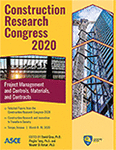Construction Research Congress 2020
Knowledge Management Systems for Structural Engineering Design in the Era of Emerging Technological Advancements
Publication: Construction Research Congress 2020: Project Management and Controls, Materials, and Contracts
ABSTRACT
As construction projects become larger, more complex, and fast-paced, the role of knowledge management (KM) is fast growing in engineering firms, which are characterized as knowledge-intensive by nature. To remain competitive and ensure project success, engineers are seeking new tools and methods to capture both explicit and implicit knowledge that can then be retrieved in a timely and efficient way. This paper aims to discuss knowledge management systems (KMS) as related to structural engineers, in the context of large, international, and multi-disciplinary engineering firms. The methodology used consists of a review of literature to identify the macro, meso, and micro level factors influencing the development of structural engineering KMS. The various strategies and steps related to the development of the KMS are then discussed. The challenges of implementing such systems are further examined in light of emerging technologies and of the complex interrelations between the different entities of large international firms. The case of a top-twenty global engineering design group is presented. Furthermore, it is argued that firms often limit KMS to their technological aspects undermining the need for a detailed and structured framework to guide the KMS initiative. Technological advancements such as knowledge discovery in databases, data analytics, artificial intelligence, platforms, and web 2.0 technologies should be rather viewed as useful tools to render the KM experience faster and more user friendly. They do not replace the need to elaborate a reliable framework based on the specific needs of structural engineers, and which can act as the backbone of KMS. Firms should also adopt strategies to promote a learning organization culture and empower engineers to become actively engaged in the KMS experience, thus ensuring an optimum retention of knowledge within their organizations.
Get full access to this article
View all available purchase options and get full access to this chapter.
REFERENCES
Alonso, F., Martínez, L., Pérez, A., and Valente, J. P. (2012). "Cooperation between expert knowledge and data mining discovered knowledge: Lessons learned." Expert Sys Appl, 39(8), 7524-7535.
Anwar, N., Kanok-Nukulchai, W., and Batanov, D. N. (2005). "Component-based, information oriented structural engineering applications." J. Comput. Civ. Eng., 19(1), 45-57.
Arriagada, D. R. E., and Alarcón, C. L. F. (2014). "Knowledge management and maturation model in construction companies." J Constr Eng Manage, 140(4).
Carrillo, P., and Chinowsky, P. (2006). "Exploiting knowledge management: The engineering and construction perspective." J Manage Eng, 22(1), 2-10.
Carrillo, P., Harding, J., and Choudhary, A. (2011). "Knowledge discovery from post-project reviews." Constr. Manage. Econ., 29(7), 713-723.
CASE (2009). "Position statement on separate structural engineering licensure." Council of American Structural Engineers, <https://docs.acec.org/pub/D1A2CAC7-CD41-7DBA-9045-197BF2971A07> (July 15, 2019).
Chinowsky, P., and Carrillo, P. (2007). "Knowledge management to learning organization connection." J Manage Eng, 23(3), 122-130.
Cristani, M., Majorana, C. E., and Salomoni, V. A. (2009). "Knowledge Representation issues in structural engineering: A framework for application in the case of structures in healthcare." Int J Technol Manage, 47(1-3), 207-238.
Dave, B., and Koskela, L. (2009). "Collaborative knowledge management-A construction case study." Autom Constr, 18(7), 894-902.
Foss, N. J., Husted, K., and Michailova, S. (2010). "Governing knowledge sharing in organizations: Levels of analysis, governance mechanisms, and research directions." J. Manage. Stud., 47(3), 455-482.
Kostova, T., and Roth, K. (2003). "Social capital in multinational corporations and a micro-macro model of its formation." Acad. Manage. Rev., 28(2), 297-317.
Lee, J. R., Hsueh, S. L., and Tseng, H. P. (2008). "Utilizing data mining to discover knowledge in construction enterprise performance records." J. Civ. Eng. Manage., 14(2), 79-84.
Mezher, T., Abdul-Malak, M. A., Khaled, M., and El-Khatib, I. (2009). "Building a knowledge management system in a design firm: The case of XYZ structural department." J. Cases Inf. Technol., 11(3), 1-17.
Nevo, D., Furneaux, B., and Wand, Y. (2008). "Towards an evaluation framework for knowledge management systems." Inf. Technol. Manage., 9(4), 233-249.
Park, M., Lee, H. S., and Kwon, S. (2010). "Construction knowledge evaluation using expert index." J. Civ. Eng. Manage., 16(3), 401-411.
Phi, S., Seo, J., and Lee, R. (2018). "Value Rating Model for Intangible Assets in Civil Engineering Consulting Firms in Korea." KSCE J. Civ. Eng., 22(12), 4719-4731.
Soibelman, L., and Kim, H. (2002). "Data preparation process for construction knowledge generation through knowledge discovery in databases." J. Comput. Civ. Eng., 16(1), 39-48.
Szelka, J., and Wrona, Z. (2016). "Knowledge Discovery in Data in Construction Projects." Arch Civ Eng, 62(2), 217-228.
Turban, E., Aronson, J. E., Liang, T. P., and Sharda, R. (2007). "Decision support and business intelligence systems." New York: Prentice Hall.
Woo, J. H., Clayton, M. J., Johnson, R. E., Flores, B. E., and Ellis, C. (2004). "Dynamic Knowledge Map: Reusing experts' tacit knowledge in the AEC industry." Autom Constr, 13(2), 203-207.
Information & Authors
Information
Published In
Construction Research Congress 2020: Project Management and Controls, Materials, and Contracts
Pages: 398 - 407
Editors: David Grau, Ph.D., Arizona State University, Pingbo Tang, Ph.D., Arizona State University, and Mounir El Asmar, Ph.D., Arizona State University
ISBN (Online): 978-0-7844-8288-9
Copyright
© 2020 American Society of Civil Engineers.
History
Published online: Nov 9, 2020
Published in print: Nov 9, 2020
Authors
Metrics & Citations
Metrics
Citations
Download citation
If you have the appropriate software installed, you can download article citation data to the citation manager of your choice. Simply select your manager software from the list below and click Download.
